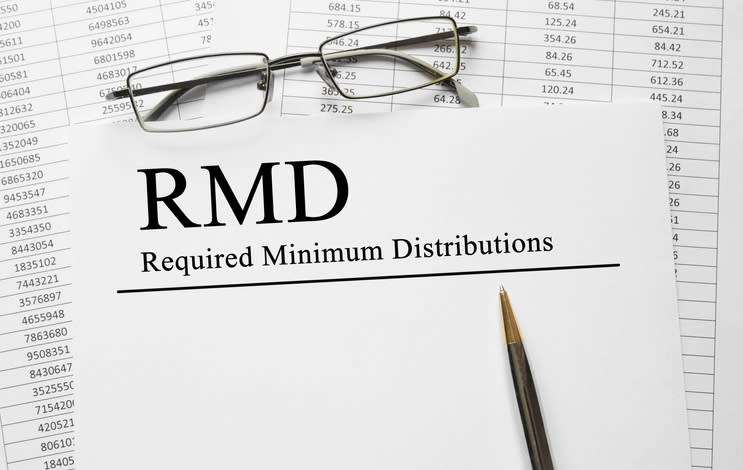Required minimum distributions (RMDs) from pre-tax retirement accounts can have a number of unintended consequences. These mandatory withdrawals can push you into a higher tax bracket, reduce your investment flexibility, increase your Medicare premiums and result in more of your Social Security benefits being taxed.
If you’re planning to convert IRA funds to a Roth account, consider talking it over with a financial advisor.
Converting a traditional IRA into a Roth account will mean you’ll avoid RMDs, but the costs are high. For example, moving $850,000 to a Roth IRA will trigger a massive income tax bill in the year in which you do the conversion. There are ways to optimize this process, but plenty of uncertainty still exists.
RMD Rules
Tax rules require you to start withdrawing a certain amount from pre-tax accounts such as traditional IRAs and 401(k)s every year starting at a predetermined age. For someone who’s currently 65, RMDs will begin at age 73. This is not optional and stiff penalties apply if you don't take RMDs exactly as specified.
Some people who already have enough income from other sources would rather not take RMDs, though. The taxes that RMDs trigger are one of the central reasons for this reluctance. The additional income from the RMDs can push you into a higher tax bracket and greatly increase your tax bill.
For example, a retired single filer with $60,000 in taxable income after deductions is in the 22% bracket in 2024 and would owe approximately $8,250 in federal income tax. But if they have to take a $50,000 RMD, their taxable income would nearly double, putting them in the 24% tax bracket. This could make their tax bill more than double to approximately $19,400.
These tax impacts aren't the only issue. Having to withdraw funds on a schedule reduces your control over your hard-earned savings. The added income may also increase Medicare Part B premiums, and require paying taxes on a portion of Social Security benefits. RMDs even affect estate planning, because having to withdraw funds and pay taxes on them reduces the amount you will be able to leave heirs.
But you need some guidance planning or managing your RMDs, consider connecting with a financial advisor and talking it over.
Avoiding RMDs
With all this in mind, it may make sense to consider converting funds from your traditional IRA to a Roth account. This can work because Roths are exempt from RMD rules.
However, conversion is not always the best strategy. One reason is that you have to pay taxes now on any funds you shift to a Roth. If you converted a $850,000 balance into a Roth in 2024, it could cost you over $267,000 in taxes.
But a different approach of gradually converting IRA funds over several years lets you manage the annual tax hit and, potentially, reduce your overall tax bill. Again, this isn't always the best move for everyone so talking it over with a financial advisor may be worthwhile.
Roth Conversion in Action
To find out if a Roth conversion could work for you, first estimate your future income and taxes. For simplicity's sake, let's assume your taxable income after deductions now is about $50,000 a year and likely to remain at that level as you enter retirement.
Now let's estimate your RMD. Let’s assume your $850,000 IRA grows at 7% until you start RMDs at age 73. In that case, IRS tables set the first-year withdrawal at about $55,000. This will bump your annual income from $50,000 to approximately $105,000 and cause your tax bill to go from about $6,000 to around $18,000.
Now consider doing a gradual conversion with the goal of emptying the IRA by age 73. Assuming you earn 7% a year and convert $132,000 each year, in eight years your IRA will be almost empty. Going forward, any Roth withdrawals you do choose to make will be tax-free.
On the downside, the annual conversions cause your taxes to go up. Your current taxable income of $55,000 added to $132,000 in Roth conversions produces income of $187,000. This pushes you into the upper reaches of the 24% bracket for a single filer without crossing into the 32% tax bracket (which applies to incomes of more than $191,950).
However, you’d pay approximately $25,000 in taxes on your first Roth conversion. While tax rates are expect to change after 2025, if you paid $25,000 per year for eight years, your total tax bill for the conversions would be around $200,000. That’s less than you would potentially pay if you converted the whole lump sum in one year. However, the question you’ll want to answer is whether this is less than what you would pay in taxes if you leave the money in a pre-tax account and take RMDs.
For the gradual conversions to save you money in the long run, you'll have to calculate how many years’ worth of RMDs will be required for your cumulative income taxes to surpass $200,000. This calculus can be complicated, so it may be worthwhile having a financial advisor run those projections for you.
Once you pinpoint that breakeven point, you can assess whether you expect to live that long.
Limits of RMD Avoidance
A major issue with Roth conversions is how you will pay the current taxes. In your case, you could come up with $25,000 a year from other sources or use a portion of the converted funds to pay the annual tax bill (since you’re over age 59 ½). If you use converted funds, however, it reduces the size of your Roth account and your future ability to make tax-free withdrawals.
This strategy requires making assumptions about income, earnings and taxes that may not pan out. For instance, if you are taxed at a lower rate in retirement compared to currently, which is not uncommon, you may be better off not converting now. Consider talking it over with a financial advisor before proceeding with either approach, though.
Bottom Line
Converting funds from an IRA to a Roth can save you on taxes in retirement, but it will cost you upfront. You may be able to reduce the total tax hit of a conversion by gradually rolling over pre-tax funds into a Roth account, but that's not always the best move. There are sizable uncertainties when using this maneuver, including challenges of forecasting future income, investment returns and tax rates. It's possible you would be better off not converting and taking RMDs as mandated.
Retirement Planning Tips
Social Security plays an important role in most people’s plan for retirement income. The age at which you claim your benefits can greatly impact your income outlook for the rest of your life. Claiming Social Security at age 62 will result in a 30% reduction compared to what it would be at your full retirement age (FRA) of 67. Meanwhile, delaying Social Security will increase your benefit by up to 8% for every year beyond your FRA (up to age 70). SmartAsset’s Social Security calculator can help you estimate how much your benefits may be.
A financial advisor can help you evaluate pros and cons of Roth conversion. Finding a financial advisor doesn't have to be hard. SmartAsset's free tool matches you with up to three vetted financial advisors who serve your area, and you can have a free introductory call with your advisor matches to decide which one you feel is right for you. If you're ready to find an advisor who can help you achieve your financial goals, get started now.
Photo credit: ©iStock.com/fizkes, ©iStock.com/Michail_Petrov-96, ©iStock.com/Wasana Kunpol
The post I'm 65 With $850,000 in an IRA. Is It Worth It to Convert That Money to a Roth to Avoid RMDs? appeared first on SmartReads by SmartAsset.


